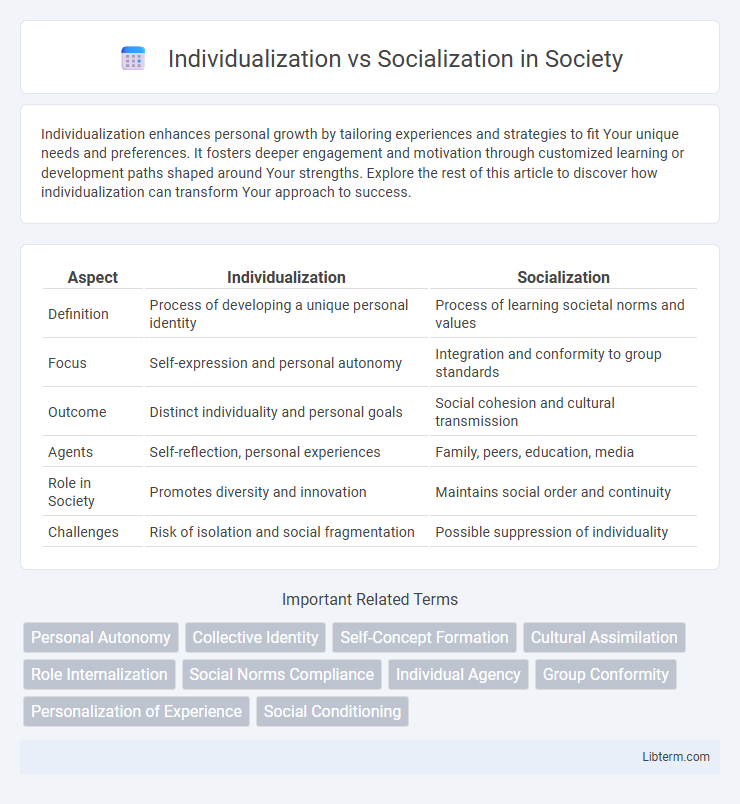Individualization enhances personal growth by tailoring experiences and strategies to fit Your unique needs and preferences. It fosters deeper engagement and motivation through customized learning or development paths shaped around Your strengths. Explore the rest of this article to discover how individualization can transform Your approach to success.
Table of Comparison
| Aspect | Individualization | Socialization |
|---|---|---|
| Definition | Process of developing a unique personal identity | Process of learning societal norms and values |
| Focus | Self-expression and personal autonomy | Integration and conformity to group standards |
| Outcome | Distinct individuality and personal goals | Social cohesion and cultural transmission |
| Agents | Self-reflection, personal experiences | Family, peers, education, media |
| Role in Society | Promotes diversity and innovation | Maintains social order and continuity |
| Challenges | Risk of isolation and social fragmentation | Possible suppression of individuality |
Understanding Individualization: Definition and Importance
Individualization refers to the process through which individuals develop distinct identities, preferences, and behaviors that differentiate them from others within a social context. It is crucial for promoting personal autonomy, self-expression, and the ability to make independent choices that align with one's unique values and experiences. Understanding individualization is essential for recognizing how personal growth interacts with social influences, shaping diverse perspectives and fostering innovation in communities.
Defining Socialization: Key Concepts and Processes
Socialization is the lifelong process through which individuals acquire the norms, values, behaviors, and social skills necessary to function effectively within society. Key concepts include agents of socialization such as family, peers, schools, and media, which influence personality development and identity formation. Socialization processes involve primary socialization during early childhood and secondary socialization throughout adulthood, shaping individual roles and social integration.
Historical Perspectives: Evolution of Individualization and Socialization
Historical perspectives reveal the evolution of individualization as societies transitioned from collective kinship-based systems to modern capitalist economies emphasizing personal autonomy and self-expression. Early socialization processes were rooted in communal rituals and shared norms essential for group cohesion, while industrialization and urbanization catalyzed the shift towards individual identity formation and personalized social roles. This transformation reflects changes in cultural values, economic structures, and technological advancements shaping the balance between individual agency and social integration over time.
Psychological Foundations: How Individuals Form Identity
The psychological foundations of identity formation emphasize the dynamic interplay between individualization and socialization processes. Individualization involves developing a unique self-concept by differentiating from social norms and integrating personal experiences, values, and desires. Socialization contributes by internalizing cultural norms, roles, and expectations, shaping identity through interactions with family, peers, and society, which together establish a coherent sense of self.
Social Norms and Group Dynamics: The Role of Socialization
Socialization plays a crucial role in shaping social norms by embedding shared values and behaviors within individuals through group interactions. Group dynamics influence conformity, cooperation, and the internalization of societal expectations, reinforcing collective identity and social cohesion. Understanding socialization processes highlights how individuals adapt to societal structures while maintaining group harmony.
Balancing Personal Autonomy and Social Responsibility
Balancing personal autonomy with social responsibility is crucial in navigating the tension between individualization and socialization. Emphasizing individual rights and self-expression must be harmonized with an understanding of community norms, social roles, and collective well-being. Effective strategies promote personal freedom while fostering empathy, cooperation, and ethical accountability within social systems.
Impact of Culture on Individualization and Socialization
Culture profoundly shapes the processes of individualization and socialization by influencing values, norms, and social expectations. Collectivist cultures tend to emphasize socialization through community and group cohesion, fostering interdependence and conformity. In contrast, individualistic cultures promote individualization by encouraging personal autonomy, self-expression, and independent decision-making.
Education Systems: Fostering Individual and Social Growth
Education systems play a crucial role in balancing individualization and socialization by promoting personalized learning paths alongside collaborative activities. Tailored curricula and technology-enhanced instruction support individual strengths and interests, while group projects, peer interaction, and community involvement cultivate social skills and collective responsibility. Effective educational frameworks integrate these approaches to foster holistic student development, preparing learners for both personal achievement and societal participation.
Challenges and Conflicts: When Individualization Clashes with Socialization
Individualization emphasizes personal identity and autonomy, often clashing with socialization processes that demand conformity and adherence to group norms. This conflict creates challenges such as identity crises, social alienation, and resistance to communal expectations. Balancing self-expression with social integration remains a critical issue in modern societies navigating these opposing forces.
Future Trends: Navigating Individualization and Socialization in a Digital Era
Future trends in navigating individualization and socialization emphasize the integration of digital technologies that foster personalized experiences while promoting community engagement. Artificial intelligence and social media platforms adapt to user preferences, balancing unique identity expression with social connectivity to create dynamic, interactive environments. Emerging virtual and augmented reality spaces enhance immersive social interactions, enabling customized yet collective experiences that redefine human relationships in the digital era.
Individualization Infographic

 libterm.com
libterm.com